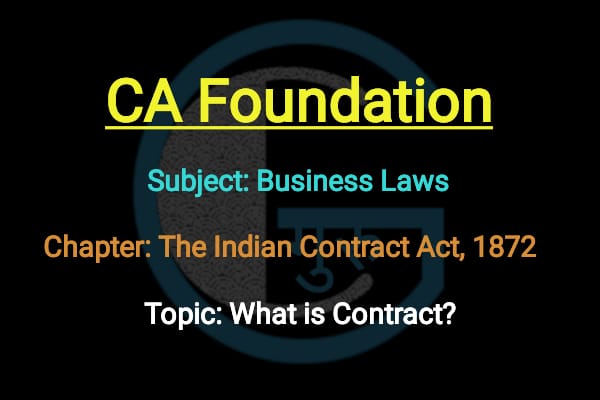The term contract is defined under section 2(h) of the Indian Contract Act, 1872 as- “an agreement enforceable by law”.
The contract consists of two essential elements:
- an agreement, and
- its enforceability by law.
1. Agreement:
The term ‘agreement’ given in Section 2(e) of the Act is defined as- “every promise and every set of promises, forming the consideration for each other”.
To have an insight into the definition of agreement, we need to understand promise.
Section 2 (b) defines promise as- “when the person to whom the proposal is made signifies his assent there to, the proposal is said to be accepted. Proposal when accepted, becomes a promise”.
Thus we say that an agreement is the result of the proposal made by one party to the other party and that other party gives his acceptance thereto of course for mutual consideration. Agreement = Offer/Proposal + Acceptance
2. Enforceability by law:
An agreement to become a contract must give rise to a legal obligation which means a duly enforceable by law.
Thus from above definitions it can be concluded that Contract = Accepted proposal/Agreement + Enforceability by law
On elaborating the above two concepts, it is obvious that contract comprises of an agreement which is a promise or a set of reciprocal promises, that a promise is the acceptance of a proposal giving rise to a binding contract. Further, section 2(h) requires an agreement to be worthy of being enforceable by law before it is called ‘contract’. Where parties have made a binding contract, they created rights and obligations between themselves.
Example: A agrees with B to sell car for Rs. 5,00,000 to B. Here A is under an obligation to give car to B and B has the right to receive the car on payment of Rs. 5,00,000 and also B is under an obligation to pay Rs. 5,00,000 to A and A has a right to receive Rs. 5,00,000.
So Law of Contract deals with only such legal obligations which has resulted from agreements. Such obligation must be contractual in nature. However some obligations are outside the purview of the law of contract.
Example: An obligation to maintain wife and children, an order of the court of law etc. These are status obligations and so out of the scope of the Contract Act.
Lets understand the process of contract by an equation-
(Proposal/Offer + Acceptance) = Accepted Proposal/Agreement
(Agreement + Legal Enforceability) = Contract
What is the difference between Agreement and Contract?
| S.No. | Basis of differences | Agreement | Contract |
| 1. | Meaning | Every promise and every set of promises, forming the consideration for each other. Offer + Acceptance | Agreement enforceable by law. Agreement + Legal enforceability |
| 2. | Scope | It’s a wider term including both legal and social agreement. | It is used in a narrow sense with the specification that contract is only legally enforceable agreement. |
| 3. | Legal obligation | It may not create legal obligation. An agreement does not always grant rights to the parties | Necessarily creates a legal obligation. A contract always grants certain rights to every party. |
| 4. | Nature | All agreement are not contracts. | All contracts are agreements. |
(Also read: Assessment MCQs with Answers for CA Course)
(Also read: Requirement of mentioning UDIN while signing Audit Reports and all Certification)
(Also read: How to order Study Material at your doorsteps by Centralized Distribution System (CDS) of ICAI)

